Unit 1 What's the matter ?SectionA(1a-2d)课件(共49张PPT)+内嵌音频
文档属性
| 名称 | Unit 1 What's the matter ?SectionA(1a-2d)课件(共49张PPT)+内嵌音频 | 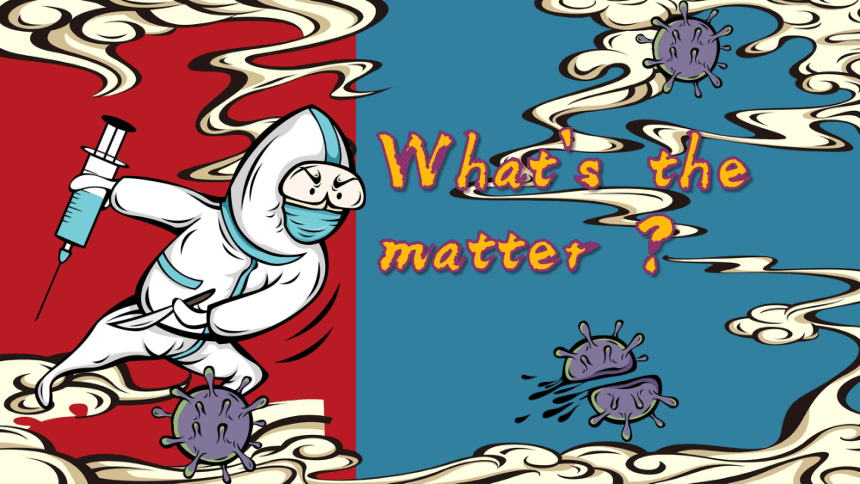 | |
| 格式 | pptx | ||
| 文件大小 | 34.1MB | ||
| 资源类型 | 试卷 | ||
| 版本资源 | 人教新目标(Go for it)版 | ||
| 科目 | 英语 | ||
| 更新时间 | 2022-12-31 21:16:20 | ||
图片预览

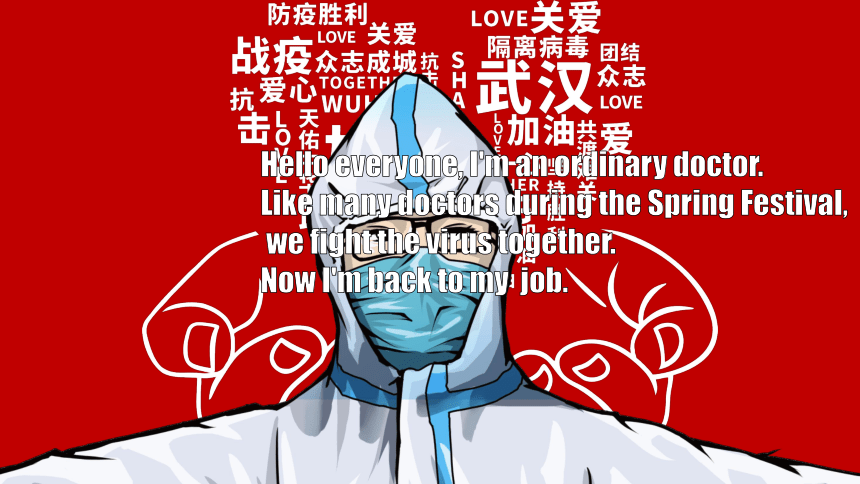
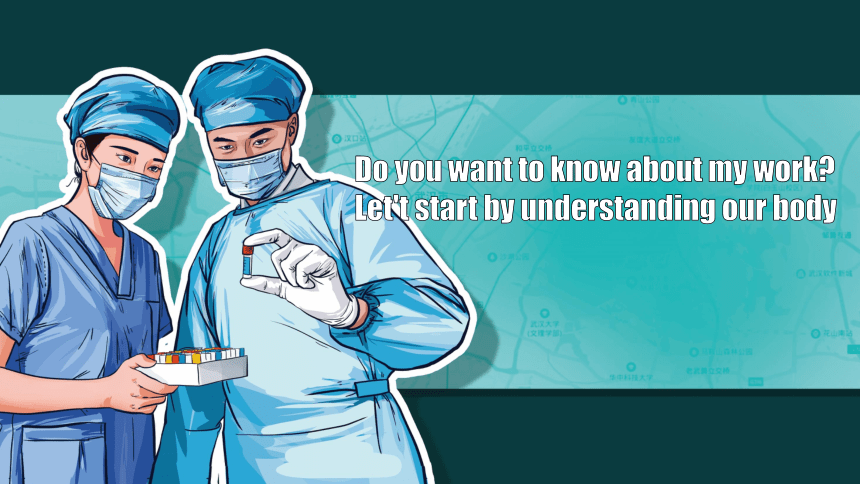
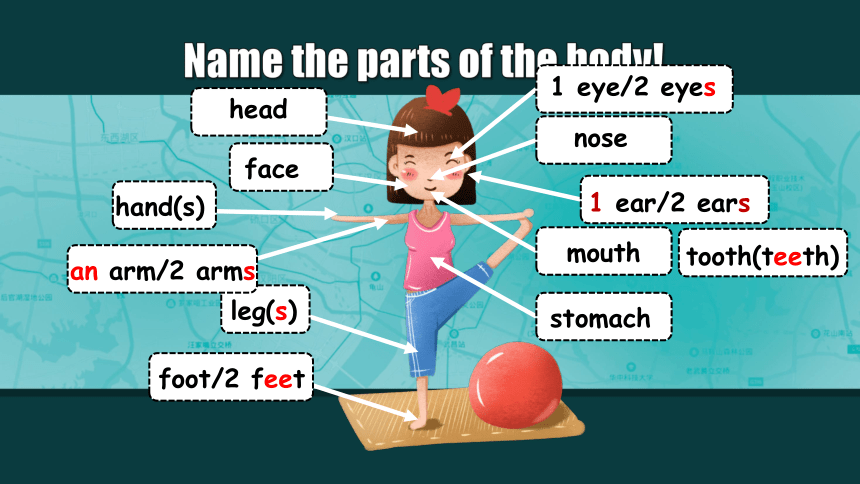

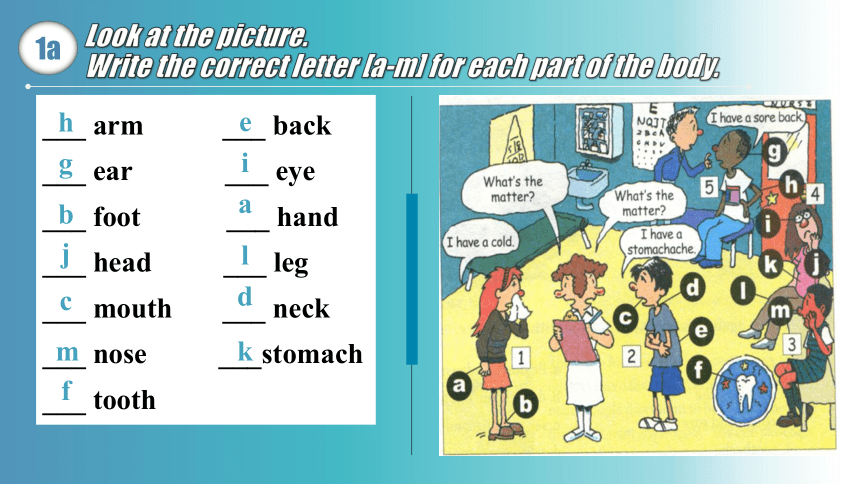

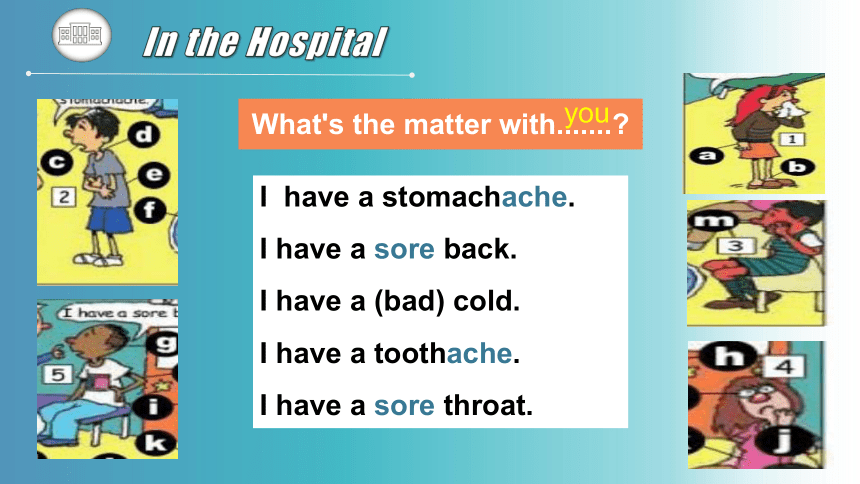
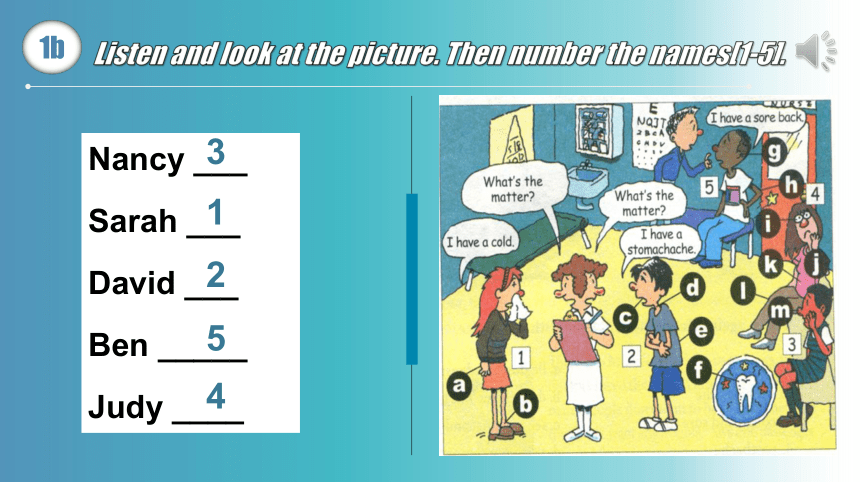
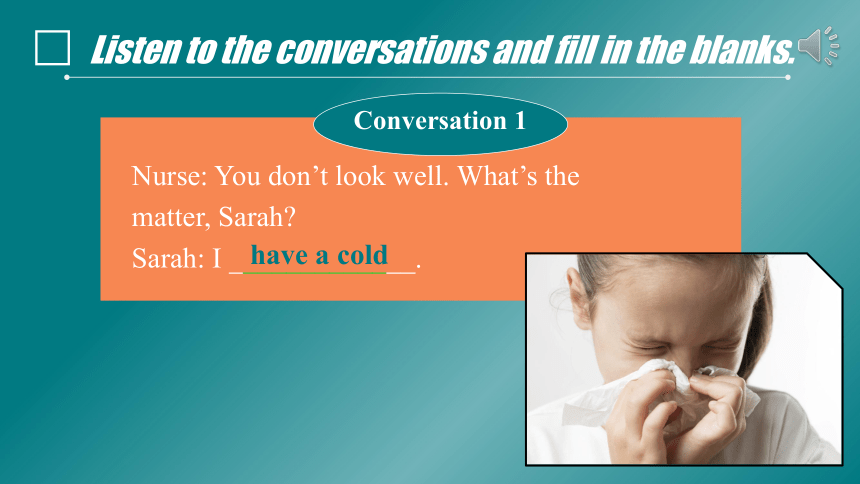
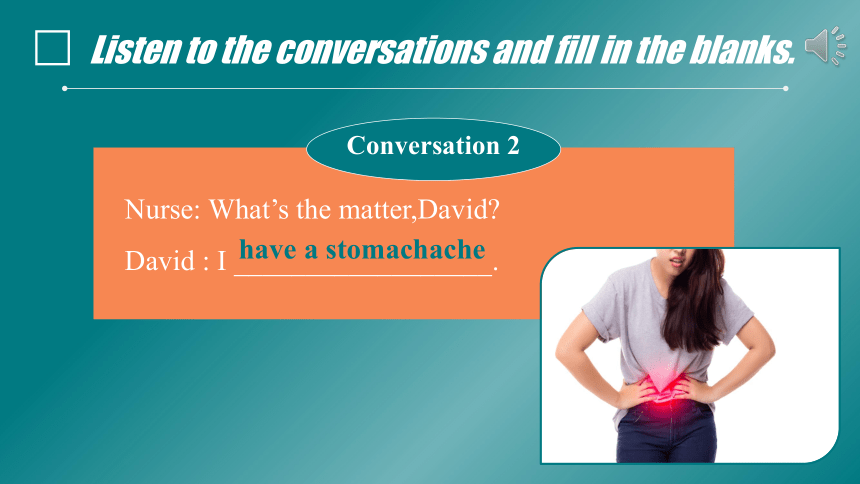
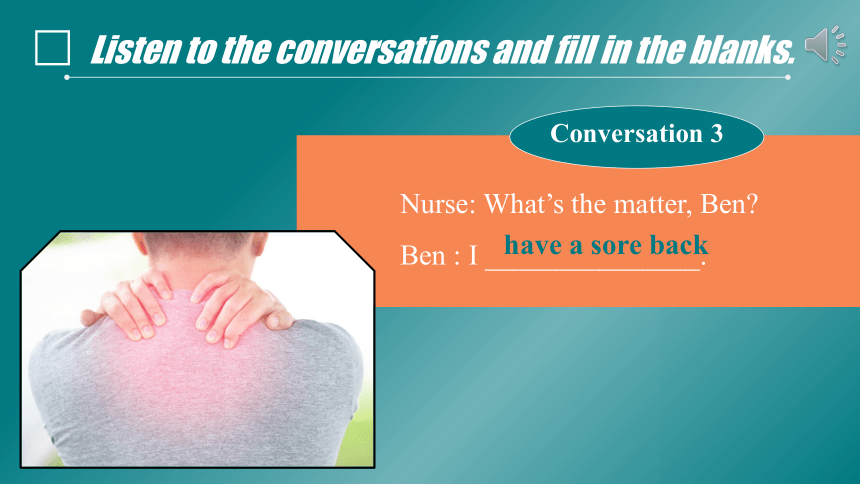
文档简介
(共49张PPT)
What`s the matter
Hello everyone, I'm an ordinary doctor.
Like many doctors during the Spring Festival,
we fight the virus together.
Now I'm back to my job.
Do you want to know about my work
Let't start by understanding our body
Name the parts of the body!
nose
head
1 ear/2 ears
mouth
tooth(teeth)
stomach
foot/2 feet
leg(s)
an arm/2 arms
hand(s)
face
1 eye/2 eyes
Look at the picture.
Write the correct letter [a-m] for each part of the body.
1a
___ arm ___ back
___ ear ___ eye
___ foot ___ hand
___ head ___ leg
___ mouth ___ neck ___ nose ___stomach
___ tooth
h
e
g
i
b
a
j
l
c
d
m
k
f
What's the matter
In the Hospital
What's the matter with.......
I have a stomachache.
I have a sore back.
I have a (bad) cold.
I have a toothache.
I have a sore throat.
you
Listen and look at the picture. Then number the names[1-5].
Nancy ___
Sarah ___
David ___
Ben _____
Judy ____
3
1
2
5
4
1b
□ Listen to the conversations and fill in the blanks.
Nurse: You don’t look well. What’s the matter, Sarah
Sarah: I _____________.
Conversation 1
have a cold
□ Listen to the conversations and fill in the blanks.
Nurse: What’s the matter,David
David : I __________________.
Conversation 2
have a stomachache
□ Listen to the conversations and fill in the blanks.
Nurse: What’s the matter, Ben
Ben : I _______________.
Conversation 3
have a sore back
□ Listen to the conversations and fill in the blanks.
Nurse: What’s the matter, Nancy
Nancy : I _______________.
Conversation 4
have a toothache
□ Listen to the conversations and fill in the blanks.
Nurse: What’s the matter, Judy
Judy : I ______________________.
Conversation 5
have a sore throat
□ Look at the picture. What are the students’ problems
Make conversations.
What’s the matter with Judy
She talked too much yesterday and
didn’t drink enough water. She has a very sore throat now.
□ Look at the picture. What are the students’ problems
Make conversations.
What’s the matter with ...
She/He/They didn’t take care of herself on the weekend. She was playing with her friends at the park yesterday. Then it got windy, but she didn’t put on her jacket. Now she has a cold.
Different Problem&Different Adivice
Listen and number the pictures(1-5) in the order you hear them.
1
2
3
4
5
2a
□ Different Problem&Different Adivice
Listen again. Match the problems with the advice.
1. fever
2. stomachache
3. cough and sore
4. toothache
5. cut myself
a. lie down and rest
b. drink some hot tea with honey
c. see a dentist and get an X -ray throat
d. take your temperature
e. put some medicine on it
□ Pairwork:A conversation between
the doctor and the patient
What's the matter
with you
What should I do
You should......
I have a......
□ It's a conversation between two kids,
Find out what happened to Lisa together.
Mandy
Mandy
Lisa
Mandy
Mandy
Lisa, are you OK
Lisa
I have a headache and I can’t move my neck. What
should I do Should I take my temperature
No, it doesn’t sound like you have a fever.
What did you do on the weekend?
Mandy
Mandy
Lisa
I played computer games all weekend.
That’s probably why. You need to take breaks away from the computer.
Yeah, I think I sat in the same way for too long without moving.
Mandy
Mandy
Lisa
I think you should lie down and rest. If your head and neck still hurt tomorrow, then go to a doctor.
OK. Thanks, Mandy.
□ Follow me:
Everybody moves your body
Nod your head and touch your face
Touch your nose and close your eyes
Touch your ears and clap your hands
Raise your arms and look at your back
Touch your stomach and tap your foot
Sit down and move your legs
Explanation
What’s the matter
What’s the matter 怎么了?
考点
常与with 连用,其后跟 sb./ sth.,引出询问的对象。
e.g. —What’s the matter (with you) (你)怎么了?
—I lost my pen./ I have a cold.
我把我的钢笔弄丢了。/ 我感冒了。
考向
—What’s ________ matter, Nancy
—I have ________ sore throat.
the; the
B. the; a
C. /; a
B
Example
I have a stomachache.
have vt. 患(病);遭受(病痛)
考点
考向
—You don’t look well. What’s the matter with you
—________.
A. I won the game B. Maybe I have a fever
C. That’s too bad
B
Example
have a cold 感冒
have a toothache 牙疼
have a fever发烧
have a headache 头疼
too much 太多
考点
too much ① 形容词性短语,中心词是much,常作定语,修饰不可数名词。
② 副词性短语,用来作状语,修饰动词。
③ 名词性短语,用来作主语、表语或宾语等。
too many 意为“太多”,用来修饰可数名词复数。
much too 意为“太……”,副词性短语,中心词是too,相当于very,修饰形容词或副词。
She talked too much yesterday and didn’t drink enough water.
enough / 'n f/ det.&adv. (to the degree that is necessary or wanted) 足够的(地);充足的(地)
enough 一词多义
考点
考向
(1) 形容词,“足够的;充足的”,修饰名词,放在名词之前。
e.g. They asked me if I had enough face masks. 他们问我是否有足够的口罩。
enough / 'n f/ det.&adv. (to the degree that is necessary or wanted) 足够的(地);充足的(地)
考向
(2) 副词,“足够地;充足地”,修饰形容词或副词,一般要放在被修饰词之后。
e.g. He is old enough to go to school. 他够上学的年龄了。
He ran fast enough. 他跑得相当快。
(3) 代词,“足够;充分”,一般是在句子里作主语或宾语。
e.g. Enough has been said about it.
关于这个说得已经够多了。
We have enough to do. 我们有足够的事要做。
enough...(for sb./sth.) to do sth. (某人/ 某物)足够做某事
考点
e.g. He has enough time to do his homework.
他有足够的时间做他的家庭作业。
The book is easy enough for you to read.
这本书很简单,你们可以看懂。
考向
It was ________ for us to solve the math problem. Few of us could even understand it.
A. easy enough B. enough easy
C. difficult enough D. enough difficult
C
Example
lie down and rest
lie /la / 躺;平躺
考点
辨析:lie 与lay
考向
原形 过去式 过去分词 现在分词
lie vi. 躺;位于 lay lain lying
lie vi. 说谎 lied lied lying
lay vt. 放置;下蛋 laid laid laying
规则是说谎(lie-lied-lied),
不规则是躺(lie-lay-lain)。
躺过就下蛋,下蛋不规则。
特色方法
lie /la / 躺;平躺
考点
—Where is Xi’s Family Garden
— It _________ 5 km south to the Old City of Xiangyang.
A. lies B. lives C. lays D. lists
A
Example
rest /rest/ v.& n. 放松;休息
考向
e.g. You should rest your eyes after a lot of reading.
在大量阅读之后,你应该休息一下你的眼睛。
rest 作名词,常用词组为
have/take a rest=have/ take a break.休息一下。
e.g. Students have a rest/break after each lesson.
学生们每节课后都休息一下。
拓展
drink some hot tea with honey
with prep. 带有;具有
考点
e.g. He likes drinking coffee with sugar. 他喜欢喝咖啡时加糖。
He is writing with a pencil.
他在用铅笔写字。
Can you go home with me
你能和我一起回家吗?
考向
Cookies are just the thing to serve ________ tall glasses of real lemon juice.
at
B. in
C. with
C
Example
My head feels very hot.
feel /fi l/ v. 摸起来;感觉
考点
feel 常用作系动词,其后跟形容词作表语。其主要用法有:
(1)表示某物摸起来给人的感觉,通常要以被摸之物作主语,不可用于进行时态。
e.g. Silk feels soft and smooth.
丝绸摸起来柔软平滑。
考向
Cookies are just the thing to serve ________ tall glasses of real lemon juice.
at
B. in
C. with
C
Example
My head feels very hot.
(2)表示某人的感觉,以人作主语,可用于进行时态。
e.g. I feel fine. / I’m feeling fine.
我感觉良好。/ 我现在感觉良好。
I don’t feel like cooking. Let’s eat out.
我不想做饭。我们出去吃吧。
考向
—Look, Linda. The f lowers in our classroom came out in one night.
—I can’t believe it. They are beautiful and colorful. They ________ great.
sound
B. smell
C. taste
B
Example
Maybe you have a fever…
maybe adv. 也许;可能。常放在句首,表示可能性,与perhaps同义。
e.g. Maybe he is on the bus.
或许他正在公共汽车上。
考点
You need to take breaks away from the computer.
take breaks 休息,相当于take/have a break。
e.g. You should take breaks from work and do some exercise. 你应该暂停工作休息一下,做些运动。
He sat under the big tree to take breaks.
他坐在那棵大树下休息。
考点
Yeah, I think I sat in the same way for too long without moving.
without /w ' a t/ prep. 没有; 缺乏
e.g. We got there without any trouble. 我们到了那儿,一路上没遇到任何麻烦。
She left the room without saying a word.
她一句话都没说就离开了房间。
考点
—I am hungry now. I come to school ________ breakfast this morning.
—You should get up early.
of B. to
C. at D. without
D
Example
If your head and neck still hurt tomorrow, then go to a doctor.
without /w ' a t/ prep. 没有; 缺乏
if conj. 如果
e.g. If it doesn’t rain tomorrow, we will go camping.
如果明天不下雨的话,我们就去野营。
考点
Vivian will take her daughter to the amusement park _______ she gets the tickets.
if B. until
C. although D. unless
A
Example
hurt /h (r)t/ v.(使)疼痛;受伤
e.g. My feet hurt. 我脚疼。
You hurt her feelings because you forgot her birthday.
你伤害了她的感情,因为你忘记了她的生日。
考点
Summery
03
Have them for one. Living grass to for subdue had lorem
□ Key words
head、ear、nose、tooth (teeth)、 foot (feet)、neck、mouth、hand、arm、stomach、eye、back、leg、throat
03
Have them for one. Living grass to for subdue had lorem
□ Target language
—What’s the matter with you/ him/ her
— I have a …
He has a…
She has a…
03
Have them for one. Living grass to for subdue had lorem
□ Giving advice
A: What’s the matter
B: I have a …
A: Maybe you should…(drink a lot of water/ go to bed/see a doctor/ take a pill)
B: That’s a good idea.
1. 牙疼
2. 胃疼
3. 背疼
4. 头疼
5. 喉咙疼
6. 发烧
7. 感冒
have a toothache
have a stomachache
have a backache
have a headache
have a sore throat
have a fever
have a cold
phrase
8. 躺下并且休息
9. 喝热蜂蜜茶
10. 喝大量水
11. 看牙医
12. 量体温
13. 看医生
lie down and rest
drink hot tea with honey
drink lots of water
see a dentist
take one’s temperature
go to a doctor
phrase
What`s the matter
Hello everyone, I'm an ordinary doctor.
Like many doctors during the Spring Festival,
we fight the virus together.
Now I'm back to my job.
Do you want to know about my work
Let't start by understanding our body
Name the parts of the body!
nose
head
1 ear/2 ears
mouth
tooth(teeth)
stomach
foot/2 feet
leg(s)
an arm/2 arms
hand(s)
face
1 eye/2 eyes
Look at the picture.
Write the correct letter [a-m] for each part of the body.
1a
___ arm ___ back
___ ear ___ eye
___ foot ___ hand
___ head ___ leg
___ mouth ___ neck ___ nose ___stomach
___ tooth
h
e
g
i
b
a
j
l
c
d
m
k
f
What's the matter
In the Hospital
What's the matter with.......
I have a stomachache.
I have a sore back.
I have a (bad) cold.
I have a toothache.
I have a sore throat.
you
Listen and look at the picture. Then number the names[1-5].
Nancy ___
Sarah ___
David ___
Ben _____
Judy ____
3
1
2
5
4
1b
□ Listen to the conversations and fill in the blanks.
Nurse: You don’t look well. What’s the matter, Sarah
Sarah: I _____________.
Conversation 1
have a cold
□ Listen to the conversations and fill in the blanks.
Nurse: What’s the matter,David
David : I __________________.
Conversation 2
have a stomachache
□ Listen to the conversations and fill in the blanks.
Nurse: What’s the matter, Ben
Ben : I _______________.
Conversation 3
have a sore back
□ Listen to the conversations and fill in the blanks.
Nurse: What’s the matter, Nancy
Nancy : I _______________.
Conversation 4
have a toothache
□ Listen to the conversations and fill in the blanks.
Nurse: What’s the matter, Judy
Judy : I ______________________.
Conversation 5
have a sore throat
□ Look at the picture. What are the students’ problems
Make conversations.
What’s the matter with Judy
She talked too much yesterday and
didn’t drink enough water. She has a very sore throat now.
□ Look at the picture. What are the students’ problems
Make conversations.
What’s the matter with ...
She/He/They didn’t take care of herself on the weekend. She was playing with her friends at the park yesterday. Then it got windy, but she didn’t put on her jacket. Now she has a cold.
Different Problem&Different Adivice
Listen and number the pictures(1-5) in the order you hear them.
1
2
3
4
5
2a
□ Different Problem&Different Adivice
Listen again. Match the problems with the advice.
1. fever
2. stomachache
3. cough and sore
4. toothache
5. cut myself
a. lie down and rest
b. drink some hot tea with honey
c. see a dentist and get an X -ray throat
d. take your temperature
e. put some medicine on it
□ Pairwork:A conversation between
the doctor and the patient
What's the matter
with you
What should I do
You should......
I have a......
□ It's a conversation between two kids,
Find out what happened to Lisa together.
Mandy
Mandy
Lisa
Mandy
Mandy
Lisa, are you OK
Lisa
I have a headache and I can’t move my neck. What
should I do Should I take my temperature
No, it doesn’t sound like you have a fever.
What did you do on the weekend?
Mandy
Mandy
Lisa
I played computer games all weekend.
That’s probably why. You need to take breaks away from the computer.
Yeah, I think I sat in the same way for too long without moving.
Mandy
Mandy
Lisa
I think you should lie down and rest. If your head and neck still hurt tomorrow, then go to a doctor.
OK. Thanks, Mandy.
□ Follow me:
Everybody moves your body
Nod your head and touch your face
Touch your nose and close your eyes
Touch your ears and clap your hands
Raise your arms and look at your back
Touch your stomach and tap your foot
Sit down and move your legs
Explanation
What’s the matter
What’s the matter 怎么了?
考点
常与with 连用,其后跟 sb./ sth.,引出询问的对象。
e.g. —What’s the matter (with you) (你)怎么了?
—I lost my pen./ I have a cold.
我把我的钢笔弄丢了。/ 我感冒了。
考向
—What’s ________ matter, Nancy
—I have ________ sore throat.
the; the
B. the; a
C. /; a
B
Example
I have a stomachache.
have vt. 患(病);遭受(病痛)
考点
考向
—You don’t look well. What’s the matter with you
—________.
A. I won the game B. Maybe I have a fever
C. That’s too bad
B
Example
have a cold 感冒
have a toothache 牙疼
have a fever发烧
have a headache 头疼
too much 太多
考点
too much ① 形容词性短语,中心词是much,常作定语,修饰不可数名词。
② 副词性短语,用来作状语,修饰动词。
③ 名词性短语,用来作主语、表语或宾语等。
too many 意为“太多”,用来修饰可数名词复数。
much too 意为“太……”,副词性短语,中心词是too,相当于very,修饰形容词或副词。
She talked too much yesterday and didn’t drink enough water.
enough / 'n f/ det.&adv. (to the degree that is necessary or wanted) 足够的(地);充足的(地)
enough 一词多义
考点
考向
(1) 形容词,“足够的;充足的”,修饰名词,放在名词之前。
e.g. They asked me if I had enough face masks. 他们问我是否有足够的口罩。
enough / 'n f/ det.&adv. (to the degree that is necessary or wanted) 足够的(地);充足的(地)
考向
(2) 副词,“足够地;充足地”,修饰形容词或副词,一般要放在被修饰词之后。
e.g. He is old enough to go to school. 他够上学的年龄了。
He ran fast enough. 他跑得相当快。
(3) 代词,“足够;充分”,一般是在句子里作主语或宾语。
e.g. Enough has been said about it.
关于这个说得已经够多了。
We have enough to do. 我们有足够的事要做。
enough...(for sb./sth.) to do sth. (某人/ 某物)足够做某事
考点
e.g. He has enough time to do his homework.
他有足够的时间做他的家庭作业。
The book is easy enough for you to read.
这本书很简单,你们可以看懂。
考向
It was ________ for us to solve the math problem. Few of us could even understand it.
A. easy enough B. enough easy
C. difficult enough D. enough difficult
C
Example
lie down and rest
lie /la / 躺;平躺
考点
辨析:lie 与lay
考向
原形 过去式 过去分词 现在分词
lie vi. 躺;位于 lay lain lying
lie vi. 说谎 lied lied lying
lay vt. 放置;下蛋 laid laid laying
规则是说谎(lie-lied-lied),
不规则是躺(lie-lay-lain)。
躺过就下蛋,下蛋不规则。
特色方法
lie /la / 躺;平躺
考点
—Where is Xi’s Family Garden
— It _________ 5 km south to the Old City of Xiangyang.
A. lies B. lives C. lays D. lists
A
Example
rest /rest/ v.& n. 放松;休息
考向
e.g. You should rest your eyes after a lot of reading.
在大量阅读之后,你应该休息一下你的眼睛。
rest 作名词,常用词组为
have/take a rest=have/ take a break.休息一下。
e.g. Students have a rest/break after each lesson.
学生们每节课后都休息一下。
拓展
drink some hot tea with honey
with prep. 带有;具有
考点
e.g. He likes drinking coffee with sugar. 他喜欢喝咖啡时加糖。
He is writing with a pencil.
他在用铅笔写字。
Can you go home with me
你能和我一起回家吗?
考向
Cookies are just the thing to serve ________ tall glasses of real lemon juice.
at
B. in
C. with
C
Example
My head feels very hot.
feel /fi l/ v. 摸起来;感觉
考点
feel 常用作系动词,其后跟形容词作表语。其主要用法有:
(1)表示某物摸起来给人的感觉,通常要以被摸之物作主语,不可用于进行时态。
e.g. Silk feels soft and smooth.
丝绸摸起来柔软平滑。
考向
Cookies are just the thing to serve ________ tall glasses of real lemon juice.
at
B. in
C. with
C
Example
My head feels very hot.
(2)表示某人的感觉,以人作主语,可用于进行时态。
e.g. I feel fine. / I’m feeling fine.
我感觉良好。/ 我现在感觉良好。
I don’t feel like cooking. Let’s eat out.
我不想做饭。我们出去吃吧。
考向
—Look, Linda. The f lowers in our classroom came out in one night.
—I can’t believe it. They are beautiful and colorful. They ________ great.
sound
B. smell
C. taste
B
Example
Maybe you have a fever…
maybe adv. 也许;可能。常放在句首,表示可能性,与perhaps同义。
e.g. Maybe he is on the bus.
或许他正在公共汽车上。
考点
You need to take breaks away from the computer.
take breaks 休息,相当于take/have a break。
e.g. You should take breaks from work and do some exercise. 你应该暂停工作休息一下,做些运动。
He sat under the big tree to take breaks.
他坐在那棵大树下休息。
考点
Yeah, I think I sat in the same way for too long without moving.
without /w ' a t/ prep. 没有; 缺乏
e.g. We got there without any trouble. 我们到了那儿,一路上没遇到任何麻烦。
She left the room without saying a word.
她一句话都没说就离开了房间。
考点
—I am hungry now. I come to school ________ breakfast this morning.
—You should get up early.
of B. to
C. at D. without
D
Example
If your head and neck still hurt tomorrow, then go to a doctor.
without /w ' a t/ prep. 没有; 缺乏
if conj. 如果
e.g. If it doesn’t rain tomorrow, we will go camping.
如果明天不下雨的话,我们就去野营。
考点
Vivian will take her daughter to the amusement park _______ she gets the tickets.
if B. until
C. although D. unless
A
Example
hurt /h (r)t/ v.(使)疼痛;受伤
e.g. My feet hurt. 我脚疼。
You hurt her feelings because you forgot her birthday.
你伤害了她的感情,因为你忘记了她的生日。
考点
Summery
03
Have them for one. Living grass to for subdue had lorem
□ Key words
head、ear、nose、tooth (teeth)、 foot (feet)、neck、mouth、hand、arm、stomach、eye、back、leg、throat
03
Have them for one. Living grass to for subdue had lorem
□ Target language
—What’s the matter with you/ him/ her
— I have a …
He has a…
She has a…
03
Have them for one. Living grass to for subdue had lorem
□ Giving advice
A: What’s the matter
B: I have a …
A: Maybe you should…(drink a lot of water/ go to bed/see a doctor/ take a pill)
B: That’s a good idea.
1. 牙疼
2. 胃疼
3. 背疼
4. 头疼
5. 喉咙疼
6. 发烧
7. 感冒
have a toothache
have a stomachache
have a backache
have a headache
have a sore throat
have a fever
have a cold
phrase
8. 躺下并且休息
9. 喝热蜂蜜茶
10. 喝大量水
11. 看牙医
12. 量体温
13. 看医生
lie down and rest
drink hot tea with honey
drink lots of water
see a dentist
take one’s temperature
go to a doctor
phrase
同课章节目录
- Unit 1 What's the matter?
- Section A
- Section B
- Unit 2 I'll help to clean up the city parks.
- Section A
- Section B
- Unit 3 Could you please clean your room?
- Section A
- Section B
- Unit 4 Why don't you talk to your parents?
- Section A
- Section B
- Unit 5 What were you doing when the rainstorm came
- Section A
- Section B
- Review of Units 1-5
- Unit 6 An old man tried to move the mountains.
- Section A
- Section B
- Unit 7 What's the highest mountain in the world?
- Section A
- Section B
- Unit 8 Have you read Treasure Island yet?
- Section A
- Section B
- Unit 9 Have you ever been to a museum?
- Section A
- Section B
- Unit 10 I've had this bike for three years.
- Section A
- Section B
